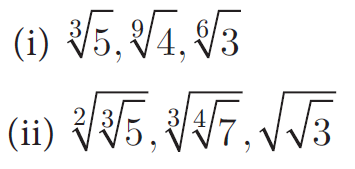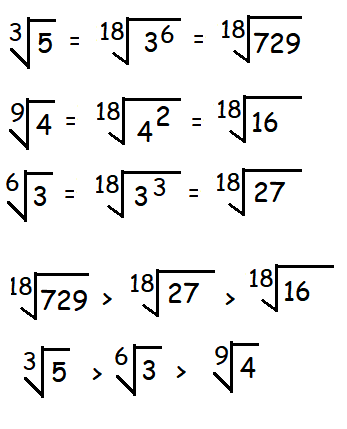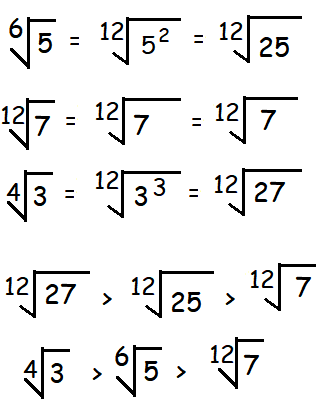ARRANGING SURDS IN DESCENDING ORDER
Subscribe to our ▶️ YouTube channel 🔴 for the latest videos, updates, and tips.
Question 1 :

Solution :
Exponential form of given radical terms.
51/3, 41/9, 31/6
L.C.M of 3, 9 and 6 is 18.

(ii) Exponential form of given radical terms.
51/6, 71/12, 31/4
Solution :

Question 2 :
Can you get a pure surd when you find
(i) the sum of two surds
(ii) the difference of two surds
(iii) the product of two surds
(iv) the quotient of two surds
Justify each answer with an example.
Solution :
(i) Let us take an example,
√2 + √2 = 2 √2
Convert into pure surd, we get
2√2 = √8
√8 is pure surd. Hence the answer is yes.
(ii) √10 - √5 = √5
Convert into pure surd, we get
√10 - √5 = √5(√2 - 1)
Hence the answer is yes.
(iii) the product of two surds
√10 x √5 = √50
Hence the answer is yes.
(iv) the quotient of two surds
√(35/7) = √5
Hence the answer is yes.
Can you get a rational number when you compute
(i) the sum of two surds
(ii) the difference of two surds
(iii) the product of two surds
(iv) the quotient of two surds
Justify each answer with an example.
Solution :
Every integer can be written as rational number. Hence the answer is yes.
Subscribe to our ▶️ YouTube channel 🔴 for the latest videos, updates, and tips.
Kindly mail your feedback to v4formath@gmail.com
We always appreciate your feedback.
About Us | Contact Us | Privacy Policy
©All rights reserved. onlinemath4all.com

Recent Articles
-
SAT Math Practice Hard Questions
Feb 16, 26 08:56 AM
SAT Math Practice Hard Questions -
SAT Math Preparation with Hard Questions
Feb 16, 26 08:15 AM
SAT Math Preparation with Hard Questions -
SAT Math Practice Problems with Answers
Feb 16, 26 07:53 AM
SAT Math Practice Problems with Answers

